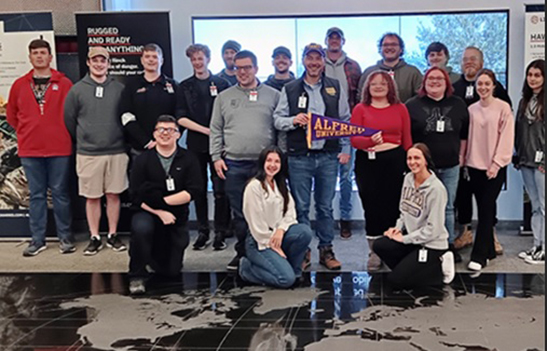Alfred University History students get up close and personal with major supplier of defense equipment to Ukraine

As the Russo-Ukrainian War settles into its second year, Alfred University Assistant Professor of History Andrew Kless is conducting a tour of the conflict in his newly designed History of Modern Warfare class, offered through the Division of Human Studies in the College of Liberal Arts and Sciences.
Twenty-one members of Kless’s class, which is cross listed for business and history credits, traveled to Rochester during the spring semester to tour the communication systems center of L3Harris Technologies Inc. The company manufactures radio equipment for both military and public safety uses.
Radio equipment is a crucial component in communications between members of public safety organizations as well as military units in the field, Kless notes. “These days, you can’t accomplish anything on a battlefield without being able to communicate with your partners, rear areas and higher command.”
Security was tight during the tour, and Kless’s students needed to be screened for security clearance before they were allowed inside the Harris facility. But their education in the realities of battlefield-grade radio equipment also was an eye opener.
Colin Page, a Business student from Avon, NY, said touring the Harris facility impressed him with its emphasis on quality control. “Communication is the foundation for everything involving first responders and military. At Harris, they told us they don’t just make radios. Everything they manufacture is designed to survive intense conditions. So, you got to see how the military has this business aspect when it comes to really important operations and management.”
Paul Boldin, a double major in History and Political Science (He plans to apply to law schools next semester), said the visit highlighted the close relationship between the military and industry. “It’s the military industrial complex in real time,” Boldin said. “It’s as close to defense production as you can get.”
Boldin’s main takeaway: One of the group’s guides related a client of the company had been waiting for delivery of radio equipment, but when the Russo-Ukraine War began, in 2022, the client declined to accept the material. “They said, ‘No, send it to Ukraine.’ I thought that was noble and a surprising fact.”
Kless notes the reliance on sophisticated technology has been a distinguishing feature of the Russo-Ukraine War, as well as other conflicts studied in the class, from the First Gulf War to the recent withdrawal of U.S. forces from Afghanistan.
“In Ukraine,” Kless said, “the Ukrainians have been intercepting Russian soldiers’ unencrypted communications. The Russians were speaking on open cell phones, and that had a pretty decisive impact on the ability of Ukrainian soldiers to fight back. Meanwhile, business manufacturers are scrambling to find supplies for their operations. This is a costly war; it requires defense industries around the world to be involved. There’s definitely an economy that goes along with war.”
In addition to his newly designed course in modern warfare, Kless has taught a range of other history classes for the Human Studies Division, including courses on Vladimir Putin and modern Russia, and the history of Fascism. He is the author of the soon-to-be published Broken Ground: Germany’s Occupation of Poland in the First World War (Peter Lang). Kless also serves as a civil affairs officers in the U.S. Army Reserves.
Students pictured in photo above, back row, from left: Noah Detwiler, Michael Schmidt, Samuel Erickson, Evan Fiumara, Hunter Heck, Zac Laury, Kayla Murray. Middle row: Paul Boldin, Ryan Hughes, Colin Page, Jay Northrop, Kevin Early, Andrew Kless, Vicky Jackson, Phoenix Andrews, Dani Brown, Lily Janik, Anthony Cetta. First row: Johnny Molyneaux, Amanda Pishtey, Hailey Hall
